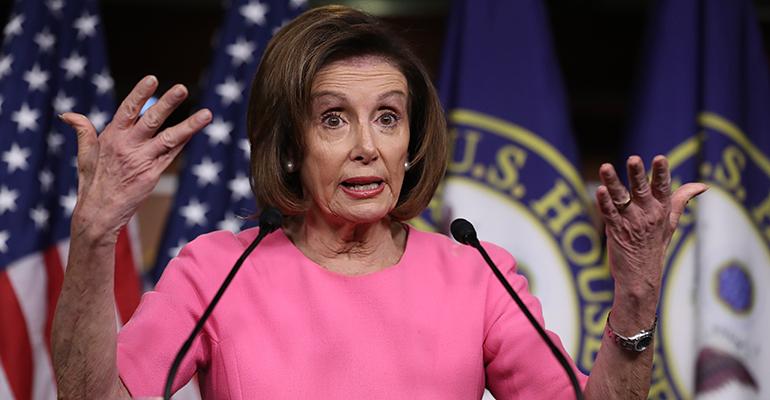A massive $2 trillion economic stimulus package designed to offer some relief for the millions of laid off workers and the nation’s small businesses was passed by the House of Representatives on Friday and sent to the President’s desk, where it will likely get his signature.
As passed earlier in the week in the Senate, the bill — dubbed the Coronavirus Aid, Relief and Economic Security, or CARES Act — includes a plan to send up to $1,200 in stimulus checks to lower and middle-income Americans to help them cover immediate bills. As of March 21, more than 3 million Americans had filed for unemployment claims, many of them restaurant workers.
A centerpiece of the bill is also designed to help restaurants struggling with the impact of forced dining room closures to prevent the spread of the virus.
Small and medium-sized businesses would be entitled to federal loans that could be forgiven — depending on whether workers remain on the payroll or are re-hired.
The bill would also extend unemployment eligibility to many workers who were previously not entitled to such benefits, including gig workers and independent contractors.
The CARES Act follows the Families First Coronavirus Response Act signed by the President earlier this month, which addresses sick and family leave mandates.
Here’s a look at how the CARES Act would impact restaurants, from various legal sources and the National Restaurant Association:
- Small business loans: The bill includes a $349 billion program for “paycheck protection” loans to businesses with 500 or fewer workers. The loan amount is based on 250% of the borrower’s average monthly payroll cost (average payroll costs x 2.5) for the preceding year, and provisions for seasonal employers are included, up to $10 million. For example, an employer with an average monthly payroll of $900,000 would be eligible for a loan of $2.25 million.
Waived are collateral requirements and the “credit elsewhere” requirements. The loan is forgiven if the money is used for payroll costs, mortgage interest or rent/utilities. But the amount of forgiveness will be reduced if employers reduce their workforce compared to prior periods, or reduces salary/wages by more than 25% during the covered period between Feb. 15 through June 30.
However, if employers re-hire all employees laid off going back to Feb. 15, or increases previously reduced wages before June 20, the loan can be fully forgiven.
For restaurants and hotels, the 500-employee count is based on the number of workers at each physical location. So a restaurant franchisee or multiconcept group with 600 employees across five properties would still qualify.
These loans are fully guaranteed by the federal government through Dec. 31, 2020, and available through SBA-certified lenders. The deadline to apply is June 30, 2020. (NRA and law firm Fisher Phillips)
- Tax benefits: The CARES Act provides a new “employee retention tax credit,” but the credit is not available to employers that take paycheck protection loans.
The credit offers employers a refundable tax credit for 50% of the wages paid during the COVID-19 crisis and applies to wages between March 13 and the end of the year.
Those eligible are employers whose operations were fully or partially suspended due to coronavirus shut-down order, or whose gross receipts declined by more than 50% compared to the same quarter the previous year.
The tax credit applies to the first $10,000 of compensation, including health benefits, paid to an eligible employee based on qualified wages. For employers with more than 100 full-time workers, “qualified wages” may include contributions to health insurance costs, but it excludes amounts for which the employer already received a tax credit. For those with fewer than 100 employees, all employee wages count, regardless of whether the business is open during the dine-in shut-down.
The Act also offers a payroll social security tax “holiday” for employers with immediate cash-flow issues. Deferred taxes must be paid over the next two years, and at least half by Dec. 31, 2021. (Fisher Phillips)
The bill also relaxes limitations on a company’s use of losses. Net Operating Losses, or NOL, are currently subject to a taxable-income limitation and they cannot be carried back to reduce income in a prior tax year. The bill allows an NOL arising in tax year beginning in 2018, 2019 or 2020 to be carried back five years. It also temporarily removes the taxable income limitation to allow an NOL to fully offset income. (Pillsbury Winthrop Shaw Pittman).
- Unemployment Insurance: The legislation creates a temporary Pandemic Unemployment Assistance program that expands federal benefits to those not traditionally eligible, including the self-employed, independent contractors and those with a limited work history. Benefits are available for those who are unemployed, partially unemployed or unable to work. It also adds $600 per week in benefits, on top of benefits already available under federal or state programs, for four months. (Pillsbury).
- Quality Improvement Property, or QIP fix: Restaurants will be able to write off costs associated with improving facilities with this retroactive amendment to the bonus depreciation rules. Sometimes called the "retail glitch," industry groups, including the NRA, have been pushing for this correction to the 2017 Tax Act. (Pillsbury)
Contact Lisa Jennings at [email protected]
Follow her on Twitter: @livetodineout





